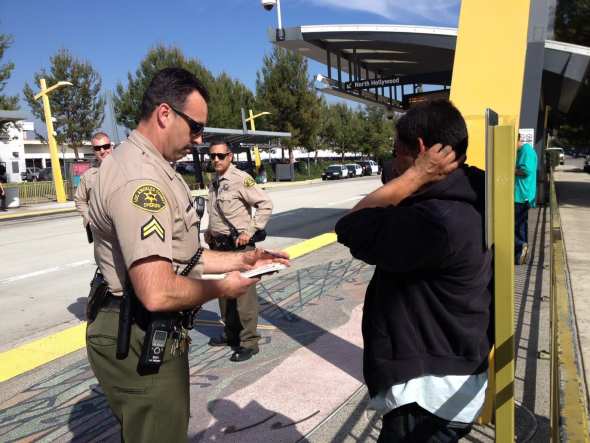This afternoon the Metro board approved extending the agency's transit policing contract an additional three years. Metro currently pays about $150 million per year for its multi-agency policing contract with LAPD, L.A. County Sheriff's Department, and Long Beach Police Department.
There's a lot not to like about current Metro policing:
- Contracted Metro law enforcement has a record of criminalization of poverty and overpolicing of code-of-conduct violations, especially for young Black and Latino riders.
- Metro law enforcement contractors and their supporters have been brazenly critical of Metro, asserting nonsensically false claims.
- Contracted Metro law enforcement agencies overshot their budget by 17 percent, then threatened to walk off the job if Metro didn't approve an additional $110 million to cover the overrun.
- Contracted law enforcement has refused Metro directions for deployment, including LASD asserting they “weren’t going to have a bus company tell them how to deploy their resources.”
- Under the current contract, deaths (and some crimes) have recently spiked on parts of the Metro system.
Since the death of George Floyd at the hands of Minneapolis police in 2020, Metro has undertaken an all-too-gradual process to reimagine its approach to public safety. Though the process did yield Metro's recently launched transit ambassador program, the broader heel-dragging on the part of law enforcement has resulted in repeated extensions of the problematic status quo.
There is some resistance to that status quo among agency leadership. For years, boardmember and County Supervisor Holly Mitchell steadfastly refused to vote for law enforcement contract renewals. Today, she was joined by recently elected Supervisor Lindsey Horvath, who proposed a substitute motion that would have had the board vote on a final contract extension in May. That motion narrowly failed.
Ultimately, with Mitchell abstaining and Horvath opposing, the contract extension passed 11-1-1.
Metro users deserve a safe & comfortable system.
— Lindsey P. Horvath (@LindseyPHorvath) March 23, 2023
We cannot handout tax dollars for services without knowing what we get in return.
I voted NO on today’s law enforcement contract extension b/c we have no specific details regarding deployment & accountability for those agencies.
A lot has changed since 2017 when Metro's current public safety contracts with law enforcement were negotiated. Currently there remains a lack of clarity on the cost of extending these contracts or if the law enforcement agencies will comply with Metro policies (1/5)
— Holly J. Mitchell (@HollyJMitchell) March 24, 2023
Transit advocates, under the umbrella of the Alliance for Community Transit (ACT-LA), rallied against the contract extension. ACT-LA and its allies are pushing for Metro to step up care-based approaches, including an expanded presence of ambassadors, station attendants, and mental health workers, as well as more services for the unhoused, restrooms for system users, and space for street vendors - plus restoring and increasing transit service (still running below pre-pandemic levels).
Thank you to everyone for turning out! We flooded Metro with over 40 minutes of rider testimony, handed them the @ACLU_SoCal petition with over 800 sign-ons, and rallied rain or shine to make Metro hear our demands. pic.twitter.com/FPp917lmoR
— ACT-LA (@All4Transit) March 23, 2023
In addition to extending the existing transit policing contract, the board unanimously voted to request a May 2023 report back on Metro expanding its own small transit police force. The board also approved a step toward that, adding 48 more Transit Security Officers focused on deterring bus operator assaults.






